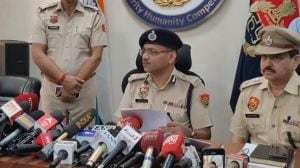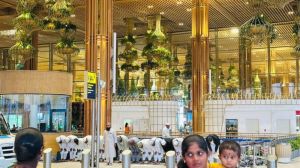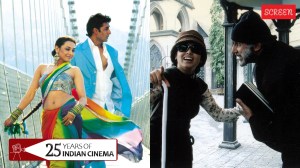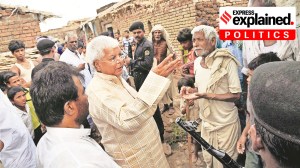‘Mayawati is a strong administrator, and her return as CM with a majority is what Uttar Pradesh needed’
Today˜s guest is somebody who tries very hard to stay out of headlines. But there are millions of rumours about him. He˜s someone who˜s almost a recluse, but paints really big on our social, corporate, and political scene, the real Saharasri Subrata Roy Sahara .

Today’s guest is somebody who tries very hard to stay out of headlines. But there are millions of rumours about him. He’s someone who’s almost a recluse, but paints really big on our social, corporate, and political scene, the real Saharasri Subrata Roy Sahara.
Thank you.
It’s taken a long time, and this is the real Mr Subrata Roy. There have been so many rumours about you . . . body doubles . . . illusions.
I don’t know why that happened. But you’re right. I’d also heard the rumours in those years. Actually, I had some problems with my blood pressure. I used to take tablets and feel fine, but doctors told me I should change my lifestyle and I just tried to change my lifestyle. I didn’t disappear. I was in Lucknow, I was very much on the phone, very much with my boys, I was there for video-conferences, I attended whatever meetings I needed to attend. People from outside used to come for them.
But you heard the rumours and speculations.
I heard them. When doctors strictly said I must maintain myself, my wife became very strict. She said not to give my any news of this sort (the rumours) or he’ll start running and forget his lifestyle change.
Some of your friends even got phone calls that you were no more.
(Laughing) Haan, Ram naam satya ho gaya tha mera!
Kis kis ko khabar mili Ram naam satya hone ki?
Bahut logon ney kaha. Jab Ram naam satya hone ki khabar aayi , I said enough is enough and came out.
There was talk of all kind of sickness . . . stroke, AIDs . . .
And the Times of India said he doesn’t have AIDS. That was a good certificate (Laughing).
But for someone from the corporate sector, who has high-profile friends, who is not socially shy, who owns media groups, you have rarely given interviews. This is a rare interview. Why?
From 1978, my work was almost 18-20 hours a day and I used to get by on three, four or five hours of sleep. Now, I’m sleeping more than six hours daily. There’s been a change in my life. I take food on time, exercise on time. After so much involvement in my work, which I really enjoy, it’s difficult to circulate socially. I want to be everywhere, meet people, but it’s not possible.
You love the world of glamour too.
Yes, I always loved it. I love those who are self-made, whether from sports, cinema, business, journalism. I’m very comfortable with them.
Tell us a few names, people you see as great examples of self-made success.
Dhirubhaiji (Dhirubhai Ambani) was one. I always admired him. And I’ve been very much influenced by Mahatma Gandhiji, whom I really worship.
Before Munnabhai came out?
Of course, much before Munnabhai . It happened after I saw Gandhi (by David Attenborough).
You started with almost nothing, and at some point you mortgaged your wife’s jewellery.
Yes, I started with just Rs 2,000. And I had to mortgage my wife’s jewellery. And that’s the reason that after every occasion, birthday or marriage anniversary, I give her lots of gold jewellery. And she tells me now to stop it. And I say, that’s psychology working in me.
So there’s whole room (pointing to Roy’s bungalow) filled with all that (Both laugh). It’s a lovely house. There are stories about your house, also about Sahara Shehar. It’s grand, but the stories make it sound grander.
It’s good naa , if that’s the story, then it’s good.
For someone who started with Rs 2,000, you now have crores. And crores of depositors, many of them poor people. Do you feel a certain sense of responsibility?
Very much. That’s the first responsibility I have because we are custodians of public money. I tell you, people go for all speculative type of investments. We never went for such investments. We never went for investment in the share market or unsecured loans, right from the beginning — for I’ve always said it’s better to have sukha daal and roti . We are custodians of public money.
How many depositors do you have?
Six crore plus. One in 17 Indians.
And is that why you are under the scanner all the time. From RBI, from the Income Tax Deparment. Or is that because of your friendships?
RBI is fine, because it is their responsibility, their duty to control and take care of such an organisation, the largest in deposit mobilisation in the private sector. We’ve crossed the levels of many private banks. So RBI has every reason to check us.
What’s the total amount being held with Sahara?
Around Rs 19,000 crore. That’s the size of the balance sheet. If I talk of deposits, we probably have collected Rs 50,000 crore and discharged the liabilities.
Some of your friends were ranged against this UPA Government. Mr Amar Singh, Mr Mulayam Singh Yadav . . . you are close to them.
Let me be very clear: apart from personal friendships, we don’t have any political relations with anybody. We don’t have any business relations with anybody. Personal relationship has nothing to do with anybody becoming vindictive.
The stories about Sahara laundering Mulayam Singh Yadav’s money?
They are like film stories. Let me use an expression — chandukhaney ki kahani hai (a story from an opium den) (Laughs). Not a single rupee of Mr Mulayam Singh Yadav is with us.
Did you finance his government?
Not even a rupee.
You made no contributions to his party?
No way.
Did you make contributions to any political party?
No. Not at all.
You didn’t pay Bill Clinton his fees when he came here?
No, I heard of it. But I never got involved in any such thing. I have many friends. Why are you talking of one or two. Many people from politics, films, sports, journalism, the corporate world. Relations are based on emotions; they have nothing to do with the commercial aspect.
What made you buy such an expensive sponsorship of the Indian cricket team? Was it emotion or was it business?
It was purely emotion. We had declined (the sponsorship) initially because the cost was very high. But then it went to some MNC. When I learnt it had gone to an MNC, I didn’t like it. Cricket is an emotional thing for the country. So we decided to go for the sponsorship and paid extra, more than the MNC had decided to pay, and we took the sponsorship.
Are you getting value for money?
I don’t know. Probably yes, but it’s very difficult to say. It’s very difficult to quantify that.
After the World Cup (debacle), did you regret taking up the sponsorship?
Yes, but not as a sponsor but as a citizen of the country. Also as a fan.
As a sponsor did you pick up the phone and tell Mr Sharad Pawar what was happening? That the team doesn’t even have a coach.
A very senior man whom I don’t want to name said, ‘Why don’t you pay them in paise and rupees for bowling and batting!’ The way they did in the World Cup left everyone upset.
What’s your view on the challenge to the BCCI from the Indian Cricket League? I believe Mr Subhash Chandra (who’s backing ICL) is a friend of yours.
Yes, he’s coming out with ICL. Kapil Devji, who’s also on our board of directors, is with him. I think anything happening for cricket is happening for its good. It (ICL) should be good for cricket. You see, once Kerry Packer started something in Australia. There was controversy, but ultimately it became such a good thing for cricket. I hope ICL brings about some good for cricket.
BCCI thinks the setting up of ICL is a subversive act. In fact, they are threatening a life ban on anybody who plays in ICL.
I think the board will definitely do that. I haven’t gone much into the details, so I can’t talk beyond this. But I spoke to Kapil Devji the other day and from the way he described it, I feel it will ultimately be good for cricket.
And if you had your way, will you back it?
If we can support it for the good of cricket, we’ll do that.
So Sahara could be the sponsor of the national cricket team for two and a half more years and then a sponsor for ICL?
That may happen in the future. I’m not ruling it out.
You’re saying both should carry on.
Both should carry on. That’s very important. I’m not trying to say that something new shouldn’t come up or that BCCI shouldn’t be there. No. Both should exist in parallel.
What’s your advice to Mr Sharad Pawar? How should he handle it?
He should concentrate on his own association, the national federation, the BCCI and the way it is going.
Instead of fighting ICL? Why do you say ‘the way it’s going’? Are there problems there?
No. There’s no problem as such. Not to my knowledge.
Whether it’s cricket, the corporate world, or film stars, their big strength is networking. You don’t just become friends with Sourav Ganguly or Leander Paes or Aishwarya Rai, you actually bring them on your board of directors. I think there are two Parivars in this country that matter most: the Sangh Parivar and the Sahara Parivar. What’s this peculiar approach to people?
Well, as I said, I always feel very comfortable in the association of people who’re achievers, whatever their field. The names you mentioned from our board, these people are all big achievers. There are many other achievers, but we obviously cannot accommodate everybody.
But there are questions about how much they contribute in terms of corporate decision-making or corporate governance.
We have a Kartavya Council, at which anyone can take up problems they are having with us anywhere in the country. The board members (are part of it) and act like ombudsmen. It’s difficult, though, to bring them all together.
Yeah, bringing together Aishwarya Rai, Sourav Ganguly, Leander Paes, Kapil Dev, and a superstar like you!
(Laughs) No, no, I’m just a worker.
You call yourself a managing worker, you have a new set of designations for your employees, you have your own way of greeting people in your company, Sahara Pranam. And I believe that if the anchor forgets to say this, he’s fired.
Yes, it is true.
Tell us a bit about it. From where does it develop? You have parades, you have uniforms.
Actually, I was very active in the NCC. I attended all the camps, took part in all the activities. And I’ve learnt a lot from the NCC. I learnt the definition of discipline from the NCC. The enthusiastic obedience of laws and orders given by . . .
This is the first time I’ve heard someone talking so glowingly of the NCC. In my days in college, the NCC was a way of getting two free bananas, one samosa, and two biscuits. And you had a two-rupee allowance.
Since you’ve raised this point, I’d like to inform you that every year we give NCC cadets more than Rs 1 crore.
I see. Where did you get Sahara Pranam from?
Let’s go one by one. Previously, it was Good Sahara. Initially, my boys were from semi-urban backgrounds and we were hardly paying them Rs 200-300 per month. You couldn’t expect good English and things like that. Someone would arrive in the evening and say ‘Good morning’ and things like that. (Laughs) So one day, I said it’d be better to greet each other with ‘Good Sahara’, whether it’s morning or night or evening. That was the beginning.
How did Good Sahara become Sahara Pranam? With the hand on the heart, almost like the American pledge.
Not American. It’s the Sahara style (Laughs). We weren’t happy with the word ‘Good’ in the greeting. We discussed it in a meeting and decided on Sahara Pranam. We are happy to have started this, it has a much better connotation, and gives you a good feeling.
But (should it be that) if an anchor fails to mention it, then, ‘See you later’?
Well, if it’s a rule, it should be followed by everybody.
A broken rule means capital punishment?
Not always. There are punishments.
But you’re a tough managing worker.
You see, kuch log hain jo swayam-bhay waale log hote hain, very a developed conscience. But some people need dand-bhay.
You need to scare them with punishment.
There are some people with whom you need to do that. Others, with developed conscience, know what to do.
Since you can’t separate one type from the other, you use the method that applies to both. Where did your designation — Managing Worker — come from?
You’ve to understand our constitution, like that of all companies. There are shareholders, directors, partners. Here, all partners, directors, and shareholders are from among the workers. Nobody has invested any money in our company. They are all workers and have become what they are with their work contribution.
But you have (invested in the company).
No, I haven’t. As I said, I started with Rs 2,000 only. And I didn’t have anything to invest. We’ve taken an oath in a court of law through a notarised affidavit. Nobody from my family can ever share any profit or asset of the company. We are all workers, genuinely.
So what happens tomorrow, if your companies go for IPOs?
We’ll have to pay dividends to outside investors.
But the family members will not share (the profits).
Never. Till today not a single rupee has been shared (by family members) as profit or dividend.
So where does your lifestyle come from?
It’s the company’s. Everything you see belongs to the company. Nothing is mine, nothing is owned by me or my family members.
So if you get listed tomorrow, your shareholders will pay for your lifestyle, which is not cheap?
I don’t think there’s any problem in that. I think everybody has that. We’ve built everything, the lifestyle you are talking about, I don’t think there is going to be any problem.
Do you take a salary?
Yeah, we take our salaries.
And you have a provident fund, I suppose.
Yes, we have a contributory provident fund.
So you have your future secured.
Yes, that’s true.
When are you planning to go public? Because one thing that adds to the mystery, or mystique, of Sahara is that very little is known in the public domain. So if Sahara or one of your companies goes public, it’ll be big news. When does the first one go public?
I think six to eight months from now, we will definitely go public.
Which one will go first?
Housing and infrastructure.
Within this financial year?
Yes, within this financial year.
How about others after that?
We’ll go public with our media groups, and a few other things after that.
You’re not selling out the media group? Because the rumour was that after your aviation firm was sold, it was going to be the media group.
Going public does not mean we are selling out.
No, what I mean is that the impression in the market is that after aviation, as part of your rationalisation plans, you want to get out of media too.
No, no, no. Not at all. No way.
So first your housing and infrastructure group goes public within this financial year?
Yes, within this financial year.
And then the media group goes public. When?
Maybe after some time.
But media is next?
Maybe our financial activities group will also go public. Our RNBC, our life insurance.
But definitely, you now intend to list your businesses?
Yes.
And you are doing this to unlock value? Or are you doing this to counter the aura or the mystery?
Both. We also do not like people talking about this mystery. I think they think that we are closely-held companies. We are not to go for newspaper announcements of our financial figures on quarterly basis or yearly basis or whatever. So it’s not needed. We need not maintain our EPS.
Because the first time anything came out in the public about your company was this tamasha over the deal with Jet.
The moment they opened the door to the aviation sector, we felt that demand and supply position was not right.
Exiting from the business — did you not see it as a defeat, as a retreat?
No. Why should it be? After all it’s a business.
No, that’s because you just said you work with emotion. Your airline was emotionally yours.
But emotions, I think, should be in the interest of the organisation.
Tell us what happened between you and Naresh Goyal of Jet Airways? What went wrong and how did you fix it?
Initially, there were some problems. . . about permission to operate in India. He didn’t have a certificate. So he tried to get it and it took lots of time.
You believe that story now?
I don’t know. I really don’t know. But we withdrew, which was unethical, I believe. I must say this. But anyway, the case went to the court and ultimately it was settled.
You are happy with the way the deal ended?
Yes, it was all done the way we wanted it to happen.
But you proved to be a very good businessman. You made a lot of money out of a business that looked like it was dead and under the water.
It was and it is. All these aviation companies are flying on the basis of the rolling factor.
Maybe when the history of Indian civil aviation is written, it will be said that Subrata Roy was the only one who made money. (Both laugh)
About aviation, it’s said that if you want to become a millionaire, that is, first become a billionaire and then become a millionaire . . .
Start an airline?
Yes, start an airline.
But you are the only one who made money. You sold planes that were not yours. You sold a brand name that the other person is not using. So it was a great deal for you.
Yes, it was a really satisfying deal.
Like many of your workers, you came from a rustic or semi-urban background. You struggled with English, I believe, though you do pretty fine now.
There are very interesting stories. Actually, I had a courtship of around seven years with my wife. I used to write long letters. Very romantically. She also used to reply. She is very literate and educated. Not like me. She topped the university etc etc. She used to write in English.
What did she see in you? (Both laugh)
Maybe a little bit of the future. So, out of an ego hassle, I also started writing to her in English. After marriage, one evening I came home to find my wife sitting with all the letters I wrote her. I thought she was being very romantic . . . all the letters were there, must be hundreds of them. I said, ‘What are you doing with them?’ And she said, ‘I’ve corrected your English. And you should go through them.’
She should have done it when there was still time.
That’s true. She was quite late.
There is a certain traditionalism about you. This whole business of aggressive patriotism, Bharat Mata, parades, uniformed guards. There is almost something militaristic about you. Where does that come from? It can’t just be the NCC?
Believe me, it is from the NCC. I had only one desire, one single ambition . . . to join the defence services. I got selected in naval aviation, and the call for medical check-up came but it reached my mother and not me. She just kept it away.
You wanted to be soldier but couldn’t become one, so you raised an army. You wanted to be a naval aviator, you couldn’t become one so you raised an aviation empire of your own. Maybe you wanted to be a cricketer, so you sponsored a whole cricket team. Are you emotion driven, or ego driven?
Ego is not a negative word. I take it a little differently. I’m not a ‘high-ego’ person. Ego is swabhiman , self-respect. One should be very rich in that; it’s the best ornament a man can have. English words like self-respect, self-esteem don’t quite capture its spirit.
You know that runs contrary to what Dhirubhai Ambani used to say, who you admire so much. He used to say that in business there should be no ego. In fact, he once said, ‘I’ll salaam anyone.’ So are you on the other end of that spectrum?
Salaam anyone? Maybe I’ll not agree there. But anyone who deserves a salaam should get it. He may be a peon, a rickshaw-wala.
What he meant was that you had to salaam babus in Delhi, politicians in Delhi, for it was the time of the licence-quota raj.
Our business is so different. We don’t have anything of that sort
You are saying your friendship with politically powerful people did nothing for your business.
Nothing for my business. Ask any politician in this country.
And you are willing to subject yourself to any inquiry on that?
Any inquiry. If anybody can say this man comes to me for favours, licences, quotas . . . not a single person can say that. It’s all personal friendship.
A lot of construction on your campus here has come to a standstill. So obviously you were getting clearances under the previous empire that you are not getting now.
No, not exactly.
Your work in your Bombay Centaur Hotel came to a standstill. I think some of it is happening, but not too much.
Yes, the case is now in the court. I don’t know why it has happened. It is unfortunate. If you go and see inside our hotel in Bombay, you will love it. And by this time it should have become one of India’s best hotels. Well, it will become one of the best after some time. But it was unfortunate.
Your Bombay hotel work has stopped, the income tax department is chasing you for a couple of years now.
Not a couple of years, but they’ve been doing that for a long time now.
Your Sahara Shehar construction has come to a standstill. You go to Delhi and you are unable to meet the leaders of the government.
No, I have very good friends the Congress.
Do you meet them often?
Oh yes.
Top level in the party?
Oh yes, definitely.
What about the stories that they are shy of meeting you?
This is all wrong.
So who have you met lately among the senior Congress people?
There are many of my old friends. If I start, I will have to take many names.
Name some of whom you have met?
There are big ones, there are medium ones, small ones too.
You almost sound like the Hutch ads, small, medium, and large (Laughing). But they aren’t shy of meeting you?
No.
Do you feel under siege right now?
No, why should I?
Because Sahara had the image of getting everything cleared. Everything used to go your way.
Whatever used to happen is happening today too. Where’s the problem?
The Bombay hotel . . .
You talked about the hotel, you are talking about the construction here. Actually we had applied for sanctions. Sanctions were made. They were there, but still with the department. It’s just matter of time. Nothing else.
You don’t think Mayawati or the Central Government in Delhi are targeting you?
No, nothing of that sort.
What’s your view on Mayawati?
She is a very strong administrator. And that’s really needed for this Pradesh (Uttar Pradesh). And she has come to power with absolute majority. As a citizen of this Pradesh, I very strongly expect that she does good for this Pradesh.
You think that this five-year tenure should be good for Uttar Pradesh?
Should be. But Uttar Pradesh is such a large state, you can’t expect any chief minister to be able to work magic. It’s not possible. It should be divided into smaller states; that will be good for people here.
You will support that idea?
Definitely.
I’m surprised that you say Mayawati’s coming to power is good for Uttar Pradesh. Also that you said good things about her, because given your friendship with the previous incumbent, one would have thought that you would feel like ashes. Your friends have lost power. Are you disappointed about that?
I tell you one thing: I never used to go to them for any favours. But for me it was a headache that people used to come to me and ask me to seek favours on their behalf, transfers and so on. It used to be irritating. I used to tell them, there’s nothing we can gain from doing that except lots of problems because you are all in power. As I said, we don’t have any political relations.
But they still happen to be friends of yours.
Tell me, in the three years Mulayamji was here, is there one benefit we have obtained. No.
And they still are your friends?
Definitely.
You are not disowning them, or distancing yourself from them.
Why should we? They are my friends, they will remain my friends. We believe that if there is a friendship and if there is everything right, then the friendship should be permanent.
At the same time you welcome Mayawati’s arrival?
Yes, her arrival with a majority is a very welcome thing for Uttar Pradesh. Anybody who brings in a stable government. It’s good for Uttar Pradesh.
So it’s not as if you will be conspiring, or you will be party to conspiracy by your favourite friends, to destabilise this government?
The word conspiracy shouldn’t be (associated) with us.
Okay then, a plan, a political strategy?
If you meet my friends, and not just the two names you mentioned, but others in other parties, they will say, ‘This man is never involved in political discussions.’ I don’t like political discussion. I talk about development, good work.
How well do you know Mayawati?
From what I’ve seen of her administrative skills, she is a tough chief minister, which is very rare.
This time, the election issue was law and order in Uttar Pradesh.
Uttar Pradesh is a victim of (lack of) law and order.
So you needed a tough chief minister.
I think we really needed one, and we are confident, and as a citizen, I strongly hope things will work well.
She’s made a difference already?
Can’t say at this stage.
I believe you have never met her?
(Laughs) I have never met her. It’s unfortunate.
How come you’ve never met her? So many politicians come and meet you.
It’s a matter of chance.
Have you sought time to meet her now?
Yes, I think I’ll meet her sometime now, because she is our chief minister and chief minister means guardian of the state.
Is she not avoiding meeting you?
I don’t think so. You have to ask her.
No, I don’t know. You live in Lucknow and you are Lucknow’s most prominent businessman, and one of India’s, the Hindi heartland’s, biggest employer.
Yes, in the heartland, yes.
So what’s your advice to Mayawati if she has to run the state for five years?
She should take care of law & order and development. She should create an environment for development.
What good qualities of the previous government should she learn from or carry forward?
The environment was good. Except the law & order. A good environment was created for people to come from outside and invest.
On law & order, nobody believed Amitabh Bachchan when he said Uttar Pradesh was doing fine.
People say it was not convincing. So, apart from law & order, there was a good atmosphere.
Pro-investment? So she should continue with that?
She should continue with that. It’s very important.
And what mistakes of the previous regime should she avoid?
Law & order again. Uttar Pradesh really needs it.
I know you introspect a lot. What mistakes of yours are you learning from? You talked about a lot of things, including Air Sahara, remember?
In general, yes, we have been very open and emotional, which was probably a mistake. I have immense respect for Atal Behari Vajpayeeji. Raj Babbar, who was one of the first celebrities to join us, stood against Atalji for elections, and we came out openly in his support. People asked use why we were supporting him (Raj Babbar) so openly. I said, ‘That should be the character of a good human being. If in good weather somebody is a friend for six years, why not in bad weather? Why not go openly?’ These things are right or correct in my dictionary, wrong in that of others.
Real life doesn’t appreciate all this too much.
Yeah, that’s right.
And what else?
Somebody had advised me that you should be discreet about so many things.
But you have been more than discreet.You disappeared.
Disappeared? No, I didn’t disappear. But now I’m sleeping more, have more time for exercise and stuff.
You found time for this interview after two years of planning.
I have great respect for you and this programme of yours, so it’s my pleasure and honour being here. I’m not doing you a favour. It’s a very good programme and anyone would love to be on it.
Thank you very much. You are at your charming best and I believe this is your little shrine.
Yes.
But you know the last time I stood in front of Bharat Mata’s statue, it was at the RSS headquarters in Nagpur. What a contrast. Your friends were the exact opposite of the BJP, and your headquarters has a shrine to Bharat Mata.
But I have friends in the BJP too.
The tone on your mobile is Vande Mataram.
That’s true, and I have wonderful friends in the BJP too.
That makes you more interesting, a man of many contradictions.
I have no political relations with anybody. It’s all personal relationships
Many contradictions, many interesting ideas, many interesting aspects, but not a dull moment. Sahara Subrata Roy, wonderful having you on this programme.
Thank you.
And a pleasure being in Sahara Shehar.
My pleasure and honour that you are here.



- 01
- 02
- 03
- 04
- 05




























